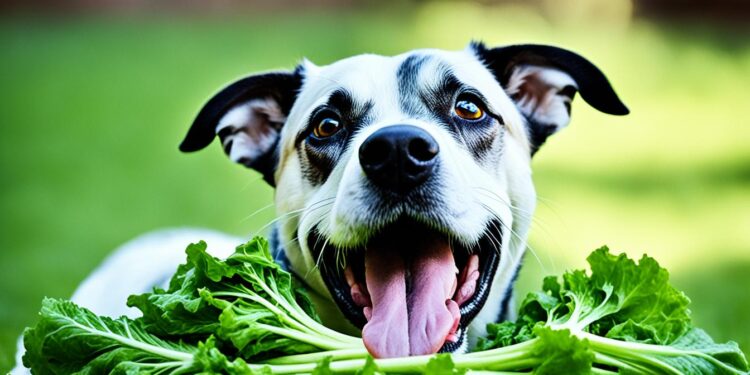Mustard Greens for Dogs: Safe or Not?

Mustard greens are a popular leafy green vegetable commonly found in many human diets. But can our furry friends, dogs, safely consume mustard greens? In this article, we will explore whether dogs can eat mustard greens, the potential health benefits, and the precautions to keep in mind.
Key Takeaways:
- Dogs can eat mustard greens in moderation as part of a balanced diet.
- Mustard greens are low in calories and high in essential vitamins and minerals.
- Wash and chop mustard greens thoroughly to remove any traces of pesticides or dirt.
- Introduce mustard greens gradually and monitor your dog for any adverse reactions.
- Consult with your veterinarian before introducing new foods, especially if your dog has underlying health concerns.
Health Benefits of Mustard Greens for Dogs
Incorporating mustard greens into a dog’s diet can offer several potential health benefits. These leafy greens are rich in vitamins A, K, and C, as well as minerals like calcium and iron. Vitamin A helps promote healthy vision and a strong immune system, while vitamin K is important for blood clotting and bone health. Vitamin C acts as an antioxidant and supports the immune system. Calcium is essential for maintaining strong bones and teeth, and iron is necessary for healthy blood circulation. The fiber content in mustard greens can also aid in digestion and promote regular bowel movements for dogs.
| Nutrient | Benefits |
|---|---|
| Vitamin A | Supports healthy vision and immune system |
| Vitamin K | Aids in blood clotting and bone health |
| Vitamin C | Acts as an antioxidant and supports the immune system |
| Calcium | Maintains strong bones and teeth |
| Iron | Supports healthy blood circulation |
Precautions for Feeding Mustard Greens to Dogs
While mustard greens can be beneficial for dogs, it’s important to take certain precautions to ensure their health and safety. Mustard greens belong to the Brassica family, which also includes vegetables like broccoli and kale. These vegetables contain compounds called glucosinolates, which can interfere with thyroid function when consumed in large amounts.
The good news is that the levels of glucosinolates in mustard greens are relatively low compared to other Brassica vegetables. However, it’s still crucial not to overfeed your dog with mustard greens to avoid any potential thyroid issues. Moderation is key when incorporating these greens into their diet.
“A little goes a long way when it comes to feeding your dog mustard greens,” advises Dr. Emily Thompson, a veterinary nutritionist.
In addition to controlling the portion size, it’s important to avoid seasoning mustard greens with any additives that can be toxic to dogs. This includes ingredients like salt, garlic, and onion. These seasonings can have adverse effects on your dog’s health and should be avoided altogether.
“Seasoning your dog’s mustard greens can do more harm than good. Stick to feeding them plain and unseasoned,” cautions Dr. Thompson.
Before introducing any new food into your dog’s diet, especially if your dog has any underlying health concerns, it’s always best to consult with your veterinarian. They can provide personalized advice based on your dog’s specific needs and address any potential risks or concerns.
| Precautions for Feeding Mustard Greens to Dogs |
|---|
| 1. Feed mustard greens in moderation to avoid potential thyroid issues. |
| 2. Avoid seasoning mustard greens with toxic ingredients like salt, garlic, and onion. |
| 3. Consult with your veterinarian before introducing any new food into your dog’s diet. |
By following these precautions, you can safely incorporate mustard greens into your dog’s diet and provide them with a nutritious and varied meal.
Conclusion
In conclusion, dogs can safely eat mustard greens as part of a balanced diet. These leafy greens offer important vitamins and minerals that can contribute to your dog’s overall health.
Mustard greens are low in calories and high in essential nutrients, including vitamins A, K, and C, as well as minerals like calcium and iron. Vitamin A promotes healthy vision and a strong immune system, while vitamin K is crucial for blood clotting and bone health. Vitamin C acts as an antioxidant and supports the immune system. Calcium is essential for maintaining strong bones and teeth, and iron is necessary for healthy blood circulation.
However, it’s important to feed mustard greens to dogs in moderation and take necessary precautions. Thoroughly washing and chopping the mustard greens is crucial to remove any traces of pesticides or dirt. Avoid seasoning the mustard greens with harmful additives like salt, garlic, or onion, as these can be toxic to dogs.
If you’re unsure about feeding mustard greens to your dog or if your dog has any health conditions, it’s always best to consult with your veterinarian for personalized advice. Every dog is different, and considering your dog’s individual needs and dietary requirements is important when making decisions about their diet.
FAQ
Can dogs safely eat mustard greens?
According to experts, dogs can eat mustard greens in moderation and as part of a balanced diet.
What are the health benefits of mustard greens for dogs?
Mustard greens are rich in vitamins A, K, and C, as well as minerals like calcium and iron, which contribute to a dog’s overall health. These include promoting healthy vision, a strong immune system, blood clotting, bone health, and aiding digestion.
Are there any precautions for feeding mustard greens to dogs?
It’s important to wash and chop the mustard greens thoroughly to remove any traces of pesticides or dirt. Dogs with certain health conditions or dietary restrictions may not be suitable candidates for consuming mustard greens. Additionally, it’s crucial to avoid overfeeding and to not season the greens with additives like salt, garlic, or onion as they can be toxic to dogs. Consulting with a veterinarian before introducing new foods is always recommended.
Can dogs develop health risks from eating mustard greens?
Mustard greens contain low levels of compounds called glucosinolates, which can interfere with thyroid function when consumed in large amounts. It’s crucial to feed mustard greens in moderation to avoid any potential thyroid issues. Additionally, it’s important to consider your dog’s individual needs and dietary requirements when making decisions about their diet.
Should I consult with a veterinarian before feeding my dog mustard greens?
Yes, it’s always best to consult with your veterinarian before introducing any new food into your dog’s diet, especially if your dog has any underlying health concerns. Every dog is different, so personalized advice from a professional is essential.






